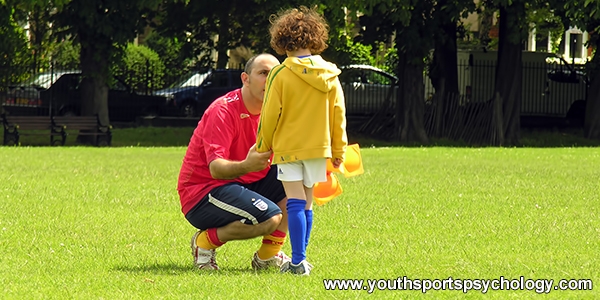Help Athletes Be Less Self-Critical
Are your sports kids critical of themselves? After every mistake or bad game, do they put themselves down?
When kids criticize themselves excessively, they experience fractured confidence, low motivation and underperformance.
The criticism also creates a loop: they perform badly…they criticize themselves…their confidence and motivation sink…they perform badly. Breaking the cycle starts with helping kids change their self-talk.
When kids dedicate a lot of time and effort to their sport, they want to see the fruits of their labor. Initial emotional responses are a sign that they care about their performance.
The problem is not their initial response to a bad game. The problem is persistent negative responses.
When young athletes bombard their minds with negative criticism, one bad game turns into two, three or four bad games. A hit-less game turns into a slump. Booting an easy grounder leads to more errors.
In reality, what does hyper self-criticism do for kids?
It doesn’t make them better players.
Kids can stop the cycle by changing their self-talk as a first step in getting back on track.
They should think of what they would say to support a teammate who is struggling. Would kids tell their teammates to quit? Would they tell their struggling teammate they will probably under perform for the rest of the season?
No! They should highlight others’ strengths. They should tell their teammates to keep working hard. They should tell teammates that they’ll experience a breakthrough soon.
Sports kids should tell themselves the same types of positive messages. Baltimore Orioles manager Brandon Hyde has been giving positive messages to rookie catcher Adley Rutschman, who has been disappointed with his early performance at the major league level.
Rutschman is batting .149 in 12 games since being promoted from Triple-A and has been charged with two throwing errors.
Still, Hyde keeps giving Rutschman positive messages to get his offense on track. Hyde is confident Rutschman will be a solid major league player.
“I told [Rutschman] when he first got here, ‘I just want you to relax. It’s going to be impossible to relax, but relax as best you possibly can and have fun with it.’ It just takes adjustments, and it takes a little bit of time, and he’s doing just fine,” said Hyde.
Hyde knows that positive messages lead to positive performance.
“I know how hard it’s going to be and difficult it is, and he just has to kind of get over the early stage of being a major league player,” said Hyde. “It’s not easy. I just think support, that’s what we’re going to do, and that’s what we’re here for is to stay positive with him.”
When kids send themselves the message to be patient, they will be more patient in games. When they tell themselves they can succeed at the next level, they will perform better.
To help develop patience, sports kids need to talk to themselves in the same manner they would talk to a struggling teammate.
Help sports kids develop positive self-talk off the field that they can use on the field. They should tell themselves, “Stay patient, let the game come to me.”
Related Articles on Youth Sports:
- Feelings Can be Contagious in Youth Sports
- Control What’s Controllable
- Help Your Athletes Close out Competitions
*Subscribe to The Sports Psychology Podcast on iTunes
*Subscribe to The Sports Psychology Podcast on Spotify
The Composed Sports Kid

“The Composed Sports Kid” audio and workbook digital download program for young athletes and their parents or coach helps kids cope with frustration and anger in sports. Help your sports kids learn how to manage expectations and let go of mistakes so they can keep their head in the game.
The Composed Sports Kid system is really two programs in one–one program to train parents and coaches how to help their kids practice composure, and one program that teaches young athletes–ages 6 to 13–how to improve composure, let go of mistakes quickly, have more self-acceptance, and thus enjoy sports more!

